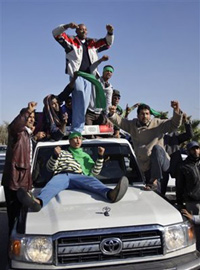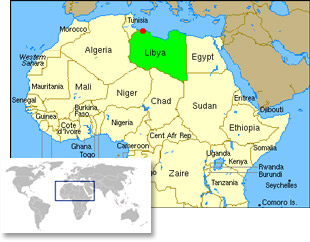FCNNEWSSOURCE

(FinalCall.com) – As President Obama, the UN and other western powers were ramping up pressure on Libyan Leader Muammar Gadhafi, some leaders in Latin America and the Caribbean called for peaceful resolution to the uprising in the North African nation they say are fueled by outside forces.
Protesters took to the streets in Libya days after protests in Tunisia and Egypt led to the resignation of their presidents while other Middle East countries announced governmental reforms in light of unrest.
With events changing quickly and some skepticism about the veracity of some western news media reports coming out of Libya, the leaders said other motives may be at work.
“The government of the United States is not concerned at all about peace in Libya and it will not hesitate to give NATO the order to invade that rich country, perhaps in a question of hours or very short days,” Cuba’s former President Fidel Castro wrote in a column in the state media.
Foreign Minister Bruno Rodriguez later released an official statement from the government, calling reports from Libya confusing, contradictory and fomenting unrest, according to published reports. “Some North American politicians and media groups are inciting violence, military aggression and foreign intervention,” Mr. Rodriguez said.
| RT News – Russian military: Reported ‘airstrikes againt protesters in Libya did not take place’ Related news: Libya Appoints New Ambassador to UN (Tripoli Post, 03-05-2011)Seif al Islam Admits “Change is the Only Direction for Libya” (Tripoli Post, 03-05-2011) Libya Govt Accepts Chavez Mediation Plan, But Not the Rebels, Reports say (Tripoli Post, 03-04-2011)Chavez Proposes International Mediation for Libya (Tripoli Post, 03-03-2011) Who is Muammar Gaddafi? (SHOAH, 03-04-2011)Massive Disinformation War against Libya for US/West Military Intervention? [The 4th Media] (03-01-2011) Libya rejects Al Jazeera report it “bombed protesters”, use of mercenaries (Al Jazeera, 02-22-2011)Fidel Catro: NATO’s plan is to occupy Libya (Granma, 02-21-2011) Farrakhan Shares Some Thoughts on Gadhafi’s Visit to America (FCN, 10-02-2009)Web Video: Interview with Col. Muammar Gadhafi (FCN, 09-27-2009) Gadhafi: Love for Africa or a personal agenda? (FCN, 09-18-2009) Mandela’s visit to Libya raises questions about U.S. policy (FCN, 11-04-1997)TIME, 1986 – LIBYA: Real and Illusionary Events (TIME, 10-13-1986)
===================================== Capital: Tripoli Independence:From European Powers, December 24, 1951 Population: 6.17 MillionReligions: Islam 97%, other 3% Language: Arabic (official), Italian, EnglishGovernment type:
|
France said it would fly aid to the opposition-controlled eastern half of the country. The European Union imposed an arms embargo and other sanctions, following the lead of the U.S. and the U.N.
There must be peaceful resolution to the unrest “without any type of meddling or international intervention, and in a manner that guarantees the integrity of the Libyan nation,” the foreign minister said.
Daniel Ortega–the president of Nicaragua whose wealth and land distribution programs in the 1980s put him at odds with the U.S., which eventually backed a movement that put him out of office–told his supporters at a rally he had expressed concern and support to Mr. Gadhafi.
“How many battles has Gadhafi had to fight? I transmitted to him from their ruler, according to the Associated Press.
The EU was also considering the creation of a no-fly zone over Libya. And the U.S. and Europe were freezing billions in Libya’s foreign assets, the AP reported. “Gadhafi has lost the legitimacy to govern, and it is time for him to go without further violence or delay,” U.S. Secretary of State Hillary Rodham Clinton said, according to AP.
“No option is off the table. That of course includes a no-fly zone,” she added.
British Prime Minister David Cameron told lawmakers: “We do not in any way rule out the use of military assets” to deal with Mr. Gadhafi ’s government.
Mr. Gadhafi , who over two weeks responded strongly to efforts to unseat his government, rejected a question from ABC News about whether he would step down as the Obama administration demanded. “My people love me. They would die for me,” he said. ABC reported that Col. Gadhafi invited the United Nations or any other organization to Libya on a fact finding mission.
Col. Gadhafi ’s remarks were met with derision in Washington. U.S. Ambassador to the U.N. Susan Rice said Col. Gadhafi ’s behavior “underscores how unfi t he is to lead and how disconnected he is from reality.”
The turmoil in the oil-rich nation roiled markets for another day.
Libya’s oil chief said Feb. 28 that production had been cut by around 50 percent, denting supplies that go primarily to Europe. The country provides 2 percent of the world’s oil, but concerns the unrest will spread to other oil-rich nations have sent oil prices rising worldwide.
The uprising that began Feb. 15 has posed the most serious challenge to Col. Gadhafi in his more than four decades in power.

News reports have said hundreds, and perhaps thousands, are dead. But clashes appeared to have eased considerably in the past few days after planeloads of foreign journalists arrived in the capital at the government’s invitation, AP said.
The two sides are entrenched, and the direction the uprising takes next could depend on which can hold out longest. Col. Gadhafi is dug in Tripoli and nearby cities, backed by his elite security forces and militiamen who are generally better armed than the military.
His opponents, holding the east and much of the country’s oil infrastructure, also control pockets in western Libya near Tripoli. They are backed by mutinous army units, but those forces appear to have limited supplies of ammunition and weapons, the AP reported.
Gadhafi opponents have moved to consolidate their hold in the east, centered on Benghazi, Libya’s second largest city, where the uprising began. Politicians there set up their first leadership council to manage day-to-day affairs, taking a step toward forming what could be an alternative to Col. Gadhafi ’s government.
Other pressure increased on Col. Gadhafi , with Western powers calling for an end to what they called a crackdown on opponents Feb. 28. Meanwhile Libyan security forces fought rebels holding the two cities closest to the capital and opponents charged his warplanes bombed an ammunition depot in the east.
The U.S. moved naval and air forces closer to Libya and said all options were open, including patrols of the North African nation’s skies to protect its citizens.












